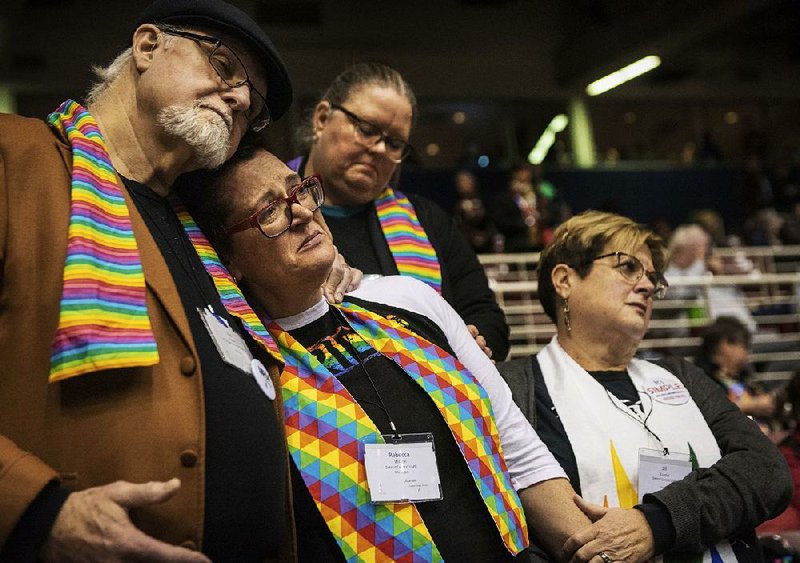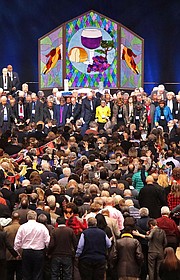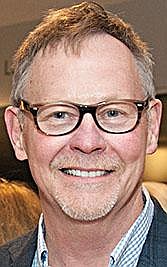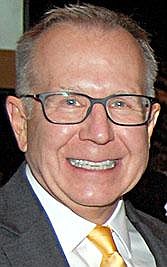ST. LOUIS -- The United Methodist Church, America's second-largest Protestant denomination, voted at a crucial conference Tuesday to strengthen the faith's divisive bans on same-sex marriage and the ordination of lesbian, gay, bisexual and transgender clergy.
Emotions were high throughout the third and final day of the meeting. Some supporters of greater LGBT inclusion were in tears, while others vented their anger when, midway through the session, delegates defeated a proposal that would have let regional and local church bodies decide for themselves on gay-friendly policies.
"Devastation," was how former Methodist pastor Rebecca Wilson of Detroit described her feelings. "As someone who left because I'm gay, I'm waiting for the church I love to stop bringing more hate."
After several more hours of debate, the conservatives' proposal, called the Traditional Plan, was approved by a vote of 438-384.
Eight delegates represented Arkansas at the global gathering, representing the statewide conference's more than 660 congregations and 130,000 members.
Arkansas Conference delegate the Rev. John Miles said he supported a modified version of the Traditional Plan, which he said was "the least bad of the plans."
"None of the plans will keep us united," said Miles. "It is hard to feel much joy in its passage."
The Rev. Britt Skarda, senior pastor of Pulaski Heights Methodist Church in Little Rock, said he was disappointed by the outcome of Tuesday's vote to proceed with the Traditional Plan.
Skarda watched the St. Louis proceedings in person, and Karon Mann, a member of Pulaski Heights, served as a lay delegate at the conference.
The Traditional Plan's success was due to an alliance of conservatives from the U.S. and overseas. About 43 percent of the delegates were from abroad, and they overwhelmingly supported the LGBT bans.
"We hoped that a more inclusive stance would be taken," said Skarda, who said in a statement on the Pulaski Heights Facebook page that the votes from the global church -- which has millions of members in Africa, Russia and other parts of Europe -- add a "vastly different context."
"We're more open and affirming than ever, and we are going to open our doors wide," Skarda said of the congregation. "We don't see that changing at all in the meantime."
"What to say right now is difficult, but I know this -- there is great pain in our midst," Arkansas Conference Bishop Gary Mueller said in a video posted to the conference's website Tuesday. "Some are happy, some are struggling, some feel the weight of the denomination turning against them.
"The church, like our nation right now, is polarized and torn apart, and we have a choice in Arkansas," Mueller said. "We can either be part of that culture or we can intentionally work to find a way beyond the divisions, beyond the polarization."
The deep split within the church was evident in several fiery speeches opposing the Traditional Plan.
"If we bring this virus into our church, it will bring illness to us all," said the Rev. Thomas Berlin of Herndon, Va. He predicted many Methodist churchgoers and some regional bodies would leave the church, while others would "stay and fight," performing same-sex weddings even if it meant punishment.
Many supporters of the more liberal plan stood in support as Berlin spoke. Some wore rainbow-motif garments or sat behind rainbow banners. After the vote, a small group of protesters carried a cross to the stage at the conference and sat around it. Another group of about 200 people staged a peaceful sitdown protest while about two dozen police officers watched.
The Rev. Allen Ewing-Merrill, a pastor from Portland, Maine, pledged defiance of the Traditional Plan, tweeting: "I will not participate in your bigotry, sin & violence."
Formed in a merger in 1968, the United Methodist Church claims about 12.6 million members worldwide, including nearly 7 million in the United States.
While other mainline Protestant denominations, such as the Episcopal and Presbyterian (U.S.A.) churches, have embraced gay-friendly practices, the Methodist church still bans them, though acts of defiance by pro-LGBT clergy have multiplied.
Enforcement of the bans has been inconsistent; the Traditional Plan aspires to beef up discipline against those engaged in defiance.
The Rev. Scott Hagan, 45, a pastor from Bonaire, Ga., supported the Traditional Plan, saying the liberals' alternative would have sent a mixed message.
"To have each church -- possibly in the same town -- offering a different perspective and practice would surely be confusing to the public that comes to the church looking for guidance," Hagan said.
Information for this article was contributed by David Crary and Jim Salter of The Associated Press and by Francisca Jones of the Arkansas Democrat-Gazette.
A Section on 02/27/2019



